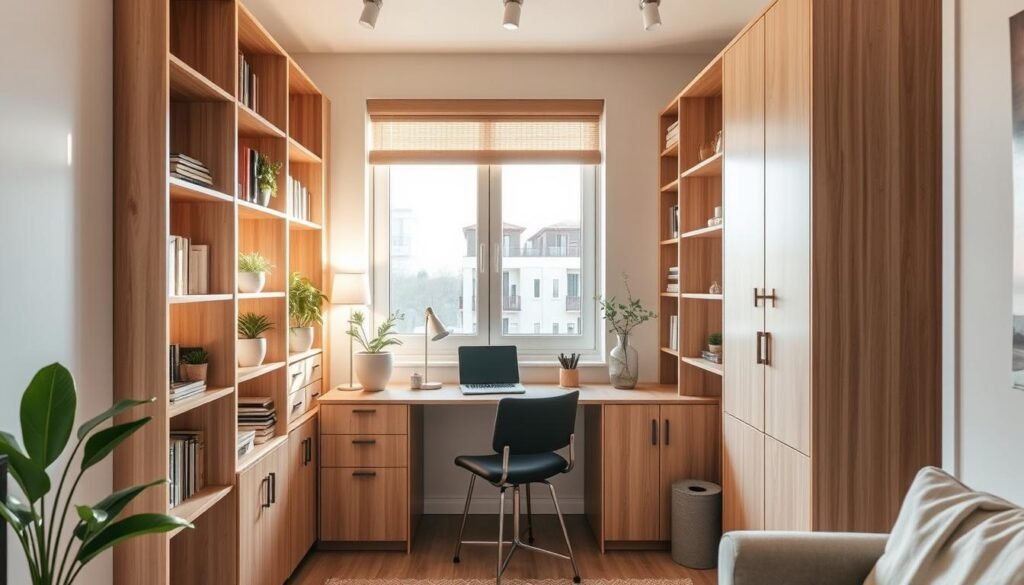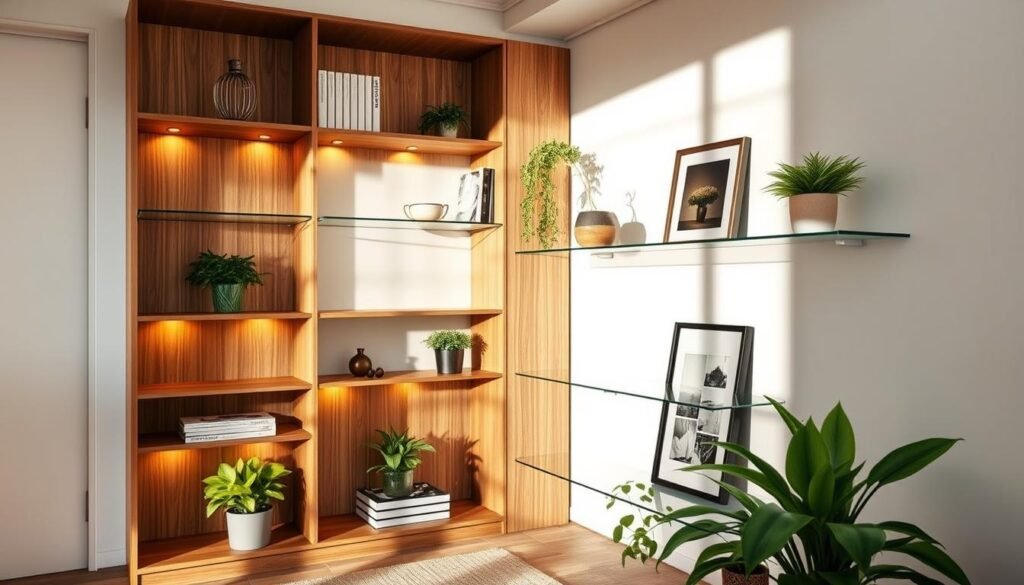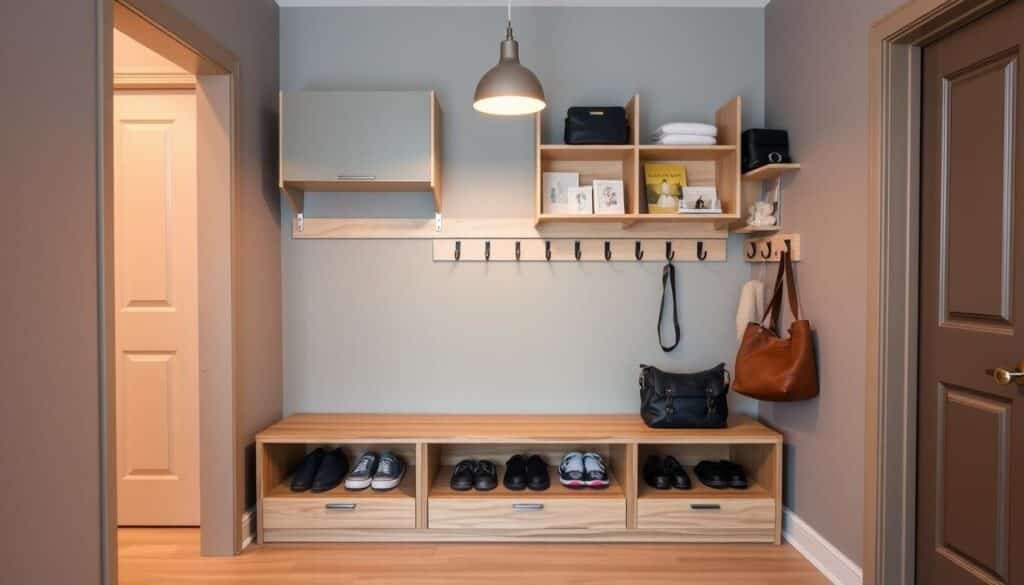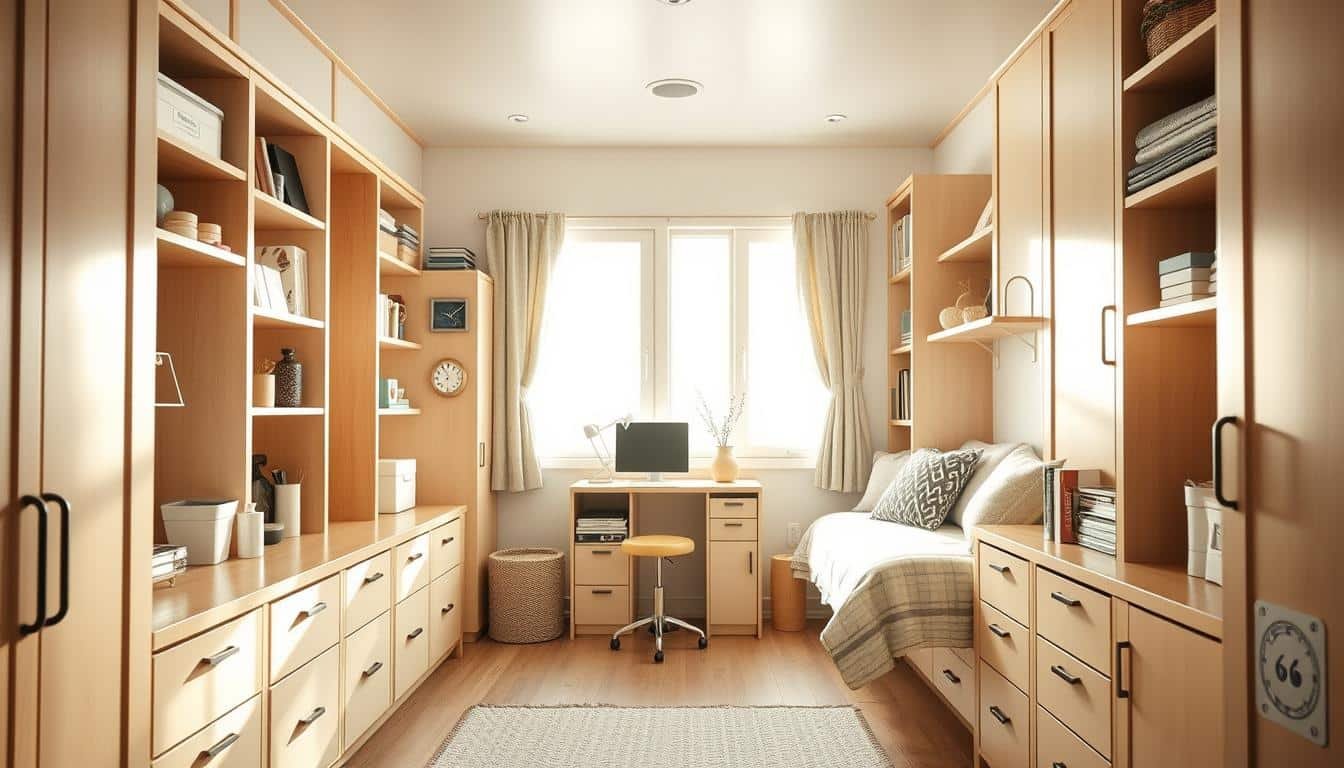This post may contain affiliate links. When you purchase through links on our site, we may earn an affiliate commission.
Did you know 28% of U.S. households live in spaces under 1,000 square feet? That’s nearly one in three Americans navigating tight corners and cluttered closets. I’ve seen firsthand how limited square footage can feel suffocating—but it doesn’t have to stay that way.
Over the years, I’ve helped dozens of clients reclaim their homes using simple, clever ideas. The secret? Treating every inch as valuable real estate. From floor-to-ceiling shelves to under-bed organizers, even the tiniest gaps can become functional zones.
You don’t need expensive renovations or endless bins. What you do need is a strategy. I’ll show you how to blend practicality with personality, turning cramped areas into spots that spark joy. Let’s turn “too small” into “just right.”
Key Takeaways
- Vertical spaces double your storage without expanding your footprint
- Multi-functional furniture solves two problems at once
- Affordable organizers like baskets and hooks keep clutter invisible
- Zoning rooms by activity prevents chaos in shared areas
- Light colors and mirrors create the illusion of openness
Understanding the Challenge of Small Spaces
Every square foot in a tight home holds hidden potential waiting to be unlocked. Through my work, I’ve discovered that success starts with observing before acting. Rushing to buy organizers often leads to more frustration—you need to map your habits first.
https://www.youtube.com/watch?v=lPleKiNfsZ0
Assessing Your Storage Needs
Spend two weeks tracking where things pile up. Notice where you actually use items versus where they should go. I once worked with a client who kept shoes by the kitchen—turns out their entryway was too narrow. We created a slim wall rack instead.
Identifying Common Clutter Culprits
Most problems fall into three categories:
- Daily essentials without dedicated spots
- Seasonal items hogging prime real estate
- “Just in case” belongings that never get used
Paperwork and bulky kitchen tools top the list in my experience. One client’s countertop disappeared under mail until we installed vertical files beside the fridge. Remember: Your space should serve you, not store what-ifs.
Custom Storage Solutions for Small Homes
Living in tight quarters often feels like solving a puzzle with missing pieces. I’ve learned that magic isn’t required—just smart design thinking. The key lies in seeing possibilities where others see dead ends.

My approach begins with a tape measure and curiosity. Those 6-inch gaps beside your fridge? Perfect for pull-out spice racks. That awkward alcove above the door? Ideal for shallow display shelves. Every measurement tells a story about how your space could work harder.
I recently transformed a client’s cramped studio using three principles: hybrid furniture, vertical layering, and hidden compartments. Their bed now lifts to reveal seasonal clothes storage, while floating shelves double as room dividers. Adaptable systems like these grow with life’s changes.
Affordability matters as much as functionality. One favorite hack involves modifying basic bookcases with tension rods for hanging items. Another uses dollar store baskets inside existing cabinets. You’d be surprised how small tweaks create big impacts without draining your wallet.
True success comes when organization feels effortless. I design systems that match your daily rhythms—like placing a charging station where keys naturally land. When your space truly fits your life, maintenance becomes second nature.
Innovative Shelving Ideas for Tight Corners
Shelving isn’t just for books anymore—it’s your secret weapon against cramped living. I’ve helped clients gain up to 18 square feet of usable area simply by rethinking vertical surfaces. The right approach turns awkward nooks into stylish displays and practical holding zones.

Lightweight Floating Displays
Floating shelves changed how I approach tight layouts. Unlike bulky bookcases, these airy platforms keep floors clear while adding character. I recently installed staggered maple shelves in a 4-foot hallway gap—now it stores cookbooks and succulents without crowding walkways.
For best results, remember:
- Use ladder-style units that narrow toward the top
- Mix depths (10″ bottom shelves, 6″ upper)
- Leave 12-15″ between rows for accessibility
| Type | Best For | Depth Range | Visual Impact |
|---|---|---|---|
| Cube Units | Open storage | 12-14″ | Modern but heavy |
| Ladder Shelves | Small rooms | 8-10″ | Space-enhancing |
| Corner Systems | Dead zones | Varies | Discreet storage |
Vertical Space Strategies
Going upward solves two problems: storage needs and ceiling-height illusions. I prefer wall-mounted cubes over floor models—they eliminate door clearance issues. One client’s 9″ kitchen gap now holds spices in pull-out racks mounted at eye level.
Corner wrap-arounds maximize typically wasted areas. A recent project used triangular shelves to display family photos while hiding board games in woven baskets below. Pro tip: Paint shelves the same color as your walls for seamless blending.
Maximizing Entryway Storage Ideas
Ever tripped over shoes while juggling grocery bags? Your entryway shouldn’t feel like an obstacle course. This high-traffic zone needs smart systems that handle chaos gracefully. Let’s transform cluttered thresholds into welcoming spaces that work harder than a Swiss Army knife.

Hooks, Baskets, and Drop Zones
Wall-mounted hooks are my go-to for vertical organization. Install them at staggered heights to accommodate kids’ backpacks and adult coats. Pair with shallow baskets for hats and dog leashes—labels keep everyone accountable.
I helped a family of five tame their entryway using:
- 3-tier hooks behind the door
- Floating shelves with foldable bins
- A narrow bench with hidden cubbies
Their secret? Assigning each member a color-coded zone. Now, mittens stay matched, and keys never vanish.
Shoe Racks and Console Tables
Traditional racks eat floor space. Instead, try a 10-inch deep cabinet with flip-down seating. The IKEA Hemnes model stores 8 pairs vertically while offering a surface for mail sorting.
| Solution | Depth | Capacity | Extra Features |
|---|---|---|---|
| Over-door racks | 4″ | 6 pairs | No assembly needed |
| Flip-top benches | 16″ | 12 pairs | Seating included |
| Tall cabinets | 14″ | 20+ pairs | Lockable drawers |
For ultra-tight spaces, I mount a shelf above hooks for sunglasses and wallets. One client added adhesive LED strips underneath—now they never fumble for keys in the dark.
Hidden and Multipurpose Storage Options
What if your home could keep secrets? Not the juicy gossip kind, but clever hideaways for life’s necessities. I’ve transformed cluttered rooms using stealthy hidden storage that tucks chaos behind stylish surfaces.
Under-the-Stairs and Built-in Nooks
That triangular void beneath your staircase? It’s begging to become functional real estate. Last month, I converted a client’s dusty under-stairs area into a reading nook with pull-out drawers. The best part? Guests only see cozy cushions—not the 14 board games stored inside.
Built-in shelves turn awkward angles into display zones. Try these space-saving setups:
| Space | Solution | Capacity Boost |
|---|---|---|
| Sloped ceilings | Angled cabinets | 8-12 cubic feet |
| Stair sides | Shallow drawers | 6-10 pairs of shoes |
| Wall recesses | Retractable desk | Laptop + supplies |
Concealed Cabinets and Flip-top Benches
Furniture that moonlights as storage is my not-so-secret weapon. I recently sourced a flip-top bench that swallows winter coats while serving as entryway seating. The trick? Choosing pieces with discreet seams—you’d never guess their hidden talents.
Ottomans with lift-up lids work wonders in living rooms. One client stores throw blankets inside theirs, keeping them handy but invisible. For kitchens, consider toe-kick drawers—they add 4-6 inches of storage below cabinets without crowding walkways.
Remember: good storage doesn’t shout. Whether it’s a window seat hiding holiday decor or a hollow ottoman corralling toys, the best solutions whisper, “I’ve got this handled.”
Creative Kitchen Storage Hacks
Your kitchen’s secret weapon against clutter isn’t more cabinets—it’s smarter use of what you’ve got. I’ve transformed galley kitchens and studio corners into organized spaces that feel twice their size. The trick? Working with your layout rather than fighting it.
Open Shelving and Adjustable Cabinets
Ditching cabinet doors freed up 18 inches of walkway in a client’s narrow kitchen. Open shelves now display their colorful dishware while keeping essentials within arm’s reach. For upper cabinets, I install adjustable tracks so shelves can shift as needs change—tall cereal boxes one month, short spice jars the next.
Three rules I swear by:
- Group items by color or shape for a curated look
- Use matching bins for messy items like tea bags
- Leave 30% of shelf space empty to avoid visual noise
Kitchen Islands with Hidden Drawers
I recently added a rolling island to a tiny apartment kitchen that stores more than it seems. The butcher-block top handles meal prep, while hidden compartments hold:
- Stackable baking sheets in vertical slots
- A tilt-out tray for foil and wraps
- Magnetic knife strips under the counter
For fixed islands, I love deep drawers with dividers that keep pans organized. One client’s 24-inch model stores their entire slow cooker collection. Pro tip: Add casters to mobile units for easy cleaning access.
| Island Type | Depth | Best Features |
|---|---|---|
| Butcher Block | 24″ | Hidden knife storage |
| Metal Cart | 18″ | Hanging utensil hooks |
| Vintage Dresser | 20″ | Deep file drawers |
My favorite hack? Turning the space above the fridge into a coffee station with pull-out shelves. Now morning routines stay contained—no more hunting for mugs in three different cabinets.
Bathroom Storage Solutions for Limited Space
Bathrooms in compact homes demand clever strategies that marry function with style. I’ve found that even the tiniest powder room can feel spacious when storage works smarter, not harder. The secret lies in layering solutions that adapt to your daily flow while hiding the chaos.
Optimized Cabinets and Drawers
Closed storage keeps essentials accessible yet invisible. I prefer shallow drawers under sinks—they’re perfect for organizing:
- Daily toiletries in acrylic dividers
- Medications in labeled bins
- Cleaning supplies in pull-out trays
For narrow gaps beside vanities, I install 6-inch cabinets with slide-out shelves. One client’s 14-inch recess now stores rolled towels and backup toilet paper—no more bulky carts crowding the floor.
Vertical Storage for Towels and Toiletries
Walls become your best ally in tight bathrooms. Here’s how I maximize vertical zones:
| Solution | Height | Capacity |
|---|---|---|
| Over-toilet units | 60″ | 12 towels + baskets |
| Corner shelves | 72″ | 30 toiletries |
| Ladder racks | 48″ | 6 folded linens |
I recently used floating shelves above a clawfoot tub to display plants and rolled washcloths. The result? A spa-like feel with hidden practicality. Pro tip: Mount a magnetic strip inside cabinet doors for tweezers and nail clippers.
Don’t overlook the wall behind the door—it’s prime real estate. A 4-inch deep shelf here holds perfume bottles or spare razors without blocking door swings. As one client told me, “It’s like finding extra square footage I never knew existed!”
Closet an
Your closet shouldn’t feel like a black hole swallowing your favorite sweater. Through my organizing projects, I’ve discovered even 32-inch-wide spaces can hold 40+ items neatly. The trick? Treating vertical space like precious Manhattan real estate.
Start by installing double hanging rods—they instantly double your capacity. I pair these with slim velvet hangers that prevent slippage. For folded items, add shelf dividers to keep stacks from toppling. One client’s 18″ deep shelf now stores 12 sweaters upright like library books.
Don’t ignore the hidden zones. The back of closet doors become perfect spots for:
- Over-door shoe organizers (holds 15 pairs)
- Jewelry rails with magnetic closures
- Mini hooks for belts and scarves
I recently transformed a 5-foot reach-in closet using modular cubes and pull-out bins. Clear labels ensure everything stays findable without rummaging. Remember: compact spaces thrive on consistency. Dedicate Sunday evenings to quick resets, and your system will maintain itself.

 using WordPress and
using WordPress and 
No responses yet